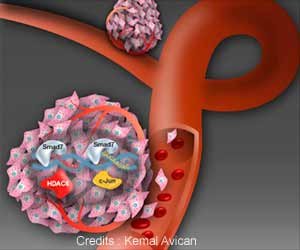New Test for Detecting Cancer Biomarkers Developed

Researchers built a sensing platform made of a gold nanoparticle and molecules called
that are labeled with a dye. The components are connected by chemical bonds, and the gold nanoparticle keeps the dye from glowing in the presence of UV light.
When a patient sample containing the enzyme MMP-14 a biomarker for various types of cancers, but most commonly for
is added, it breaks bonds in the peptides, separating a fragment with the dye from the gold. Without the gold to absorb the energy from the dye, the sample begins to glow.
The light glowing from the sample depends on the concentration of the enzyme and interaction time. By measuring that light, researchers can generate data that inform them if a cancer marker is present in a sample and at what levels.
Advertisement
Various tests already exist for examining whether a patient has cancer. This research is the first step toward developing a method that can test for a wider variety of cancers. Researchers tested their system with the MMP-14 enzyme but they plan to expand this research with work that matches more peptide chains with other enzyme cancer markers.
With further development, it could allow scientists to use a single assessment to test for a variety of cancers at once. The platform they have designed applies to any enzyme.
Along with its applications for detecting disease, the research also sheds more light on how enzymes interact with peptides that are attached to nanoparticles and how the addition of enzymes affects the testing system.
Cancer diagnosis is still a huge problem. Early detection has been a limiting factor. But the other aspect of this work was the ability to develop a platform that starts with a nanoparticle attached to a peptide labeled with a dye and understand the way they interact.
Source: Eurekalert
Source link
#Test #Detecting #Cancer #Biomarkers #Developed



